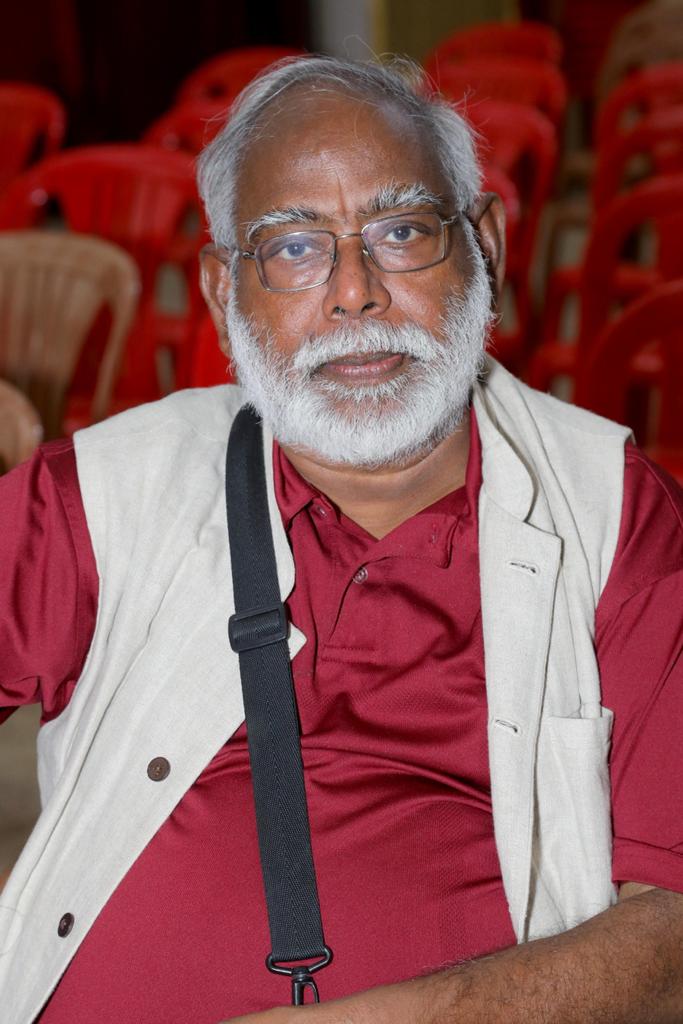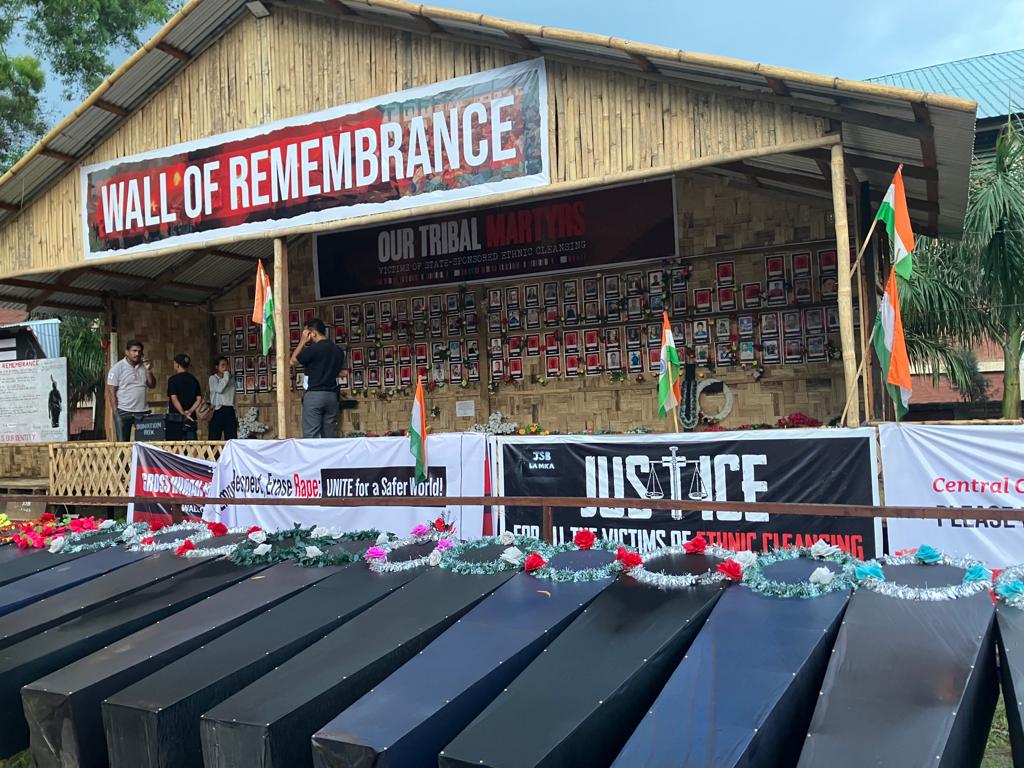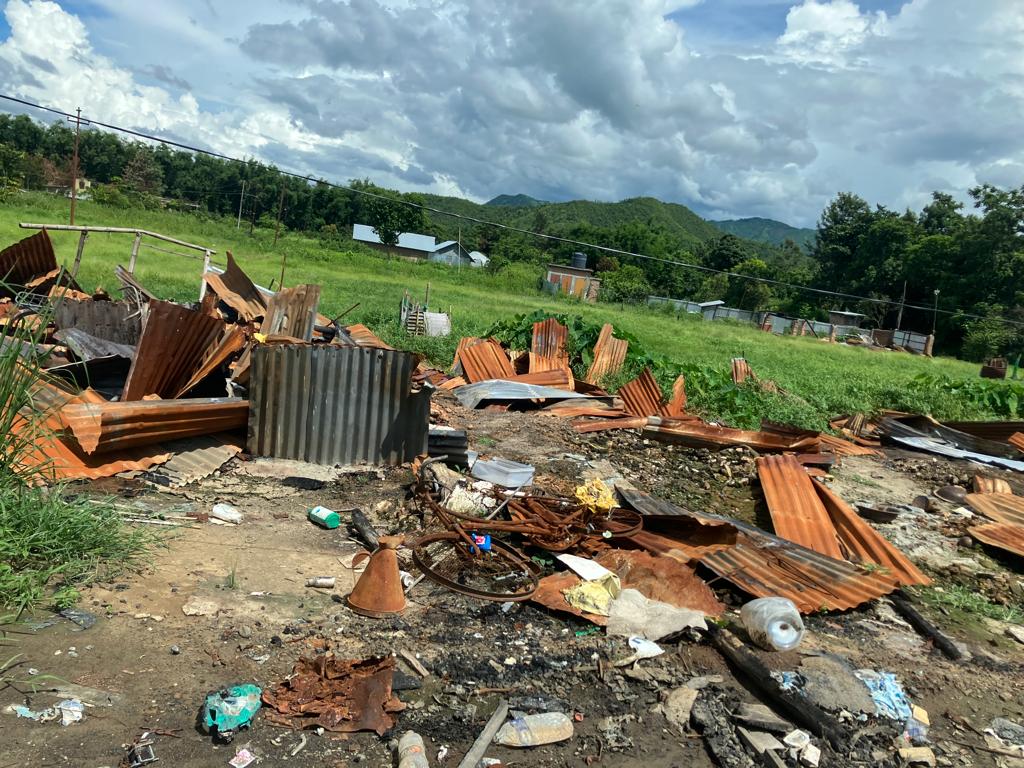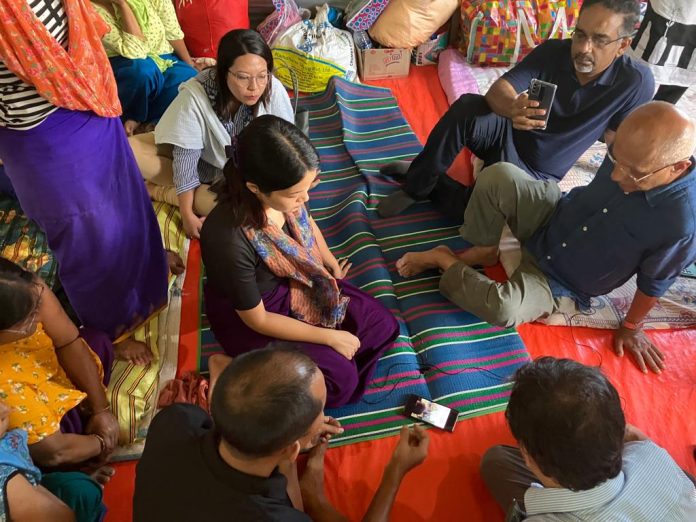
What is your observation of ground situation in Manipur after your visit?
It’s depressing scenario. Our visit as Karwan-e-Mohabbat to various parts of the state, including the Meitei dominated valley, the Kuki home hills of Churachandpur, and other districts, and two institutions of the Nagas in the hills around north of Imphal valley shows very clearly that it is a situation which is very fraught, with an explosive future, unless instant steps are taken to restore an essential confidence between the two groups, which have grown so far apart as to seem totally irreconcilable.
The political solution may take a long time, months, possibly years, but the human crisis is a tragedy that demands a solution right now. The refugee camps of Kukis in church compounds are running short of food for children, short of proteins and crucial vitamins, and above all, of all medical care. There are no medicines worth speaking about, particularly when it comes to serious illnesses and life-threatening situations. It is also an unfortunate fact what Mr Modi’s inaction has encouraged extreme right wing religious cadres in the valley and other elements to strengthen their position and mount a second wave of hate campaign against the Kukis.

One result is that even the dead have not been allowed to be buried. The Kukis wanted to bury more than 30 bodies which have been lying in mortuaries for almost three months. They had sought land for burial from the government, but the Meitei community led by its women made it sure that the burial did not take place. While a token virtual barrier was organised in Churachandpur, the bodies remain as they were. It is quite clear that these are symbolic situations which speak of hardened lines between the Kukis and the Meiteis. It is also clear that whether it is government or civil society, or the senior Meitei Mothers, there seems to be a concerted, united, and coordinated effort to deny the Kukis their humanity, their customary, traditional tribal identity, and their citizenship.
Wherever you go, there is only one phrase that is used by the Meitei, irrespective of rank, age, and social standing, to describe the Kukis. The phrase they use is “Chin-Kuki-narco-terrorist”. They say it in one breath. It may be recalled that political groups created similar names to demonise Muslims in Bombay and Gujarat, along the Pakistan border, and in Assam and Bengal, painting them as illegal immigrants, terrorists and criminals. They were chased as people who had infiltrated from other countries into India. The children of today, the political forces, and even human rights groups, have now been educated in this new idiom against the Kukis.
More than ever before, rumours are being manufactured and it is easy to believe that many of the militia and paramilitary forces may have also taken the same attitude towards the Kukis. This can only add to the suspicion that the Kukis have towards the state government, towards the Meitei as a group, and towards the central government, assuming that all of them are denying them human identity and their existence on a land which has been there. This requires of the central government, and particularly of Mr Modi, a deep humane touch, with a gift of administrative ability. He has to prove to us that he is in possession of these two traits, and that he has the political will to resolve this crisis to the satisfaction of all groups involved.
What do you think should be the long-lasting solution to the crisis in Manipur? What people are saying there?
Status quo ante is the only solution. Nothing should be done to change the geography of definite communities; nothing should be done to change the boundaries of the state. In fact, the Nagas were not involved in the current confrontation. The Kukis and the Meiteis have to be reassured that the government is neutral and has their best interests at heart. The Kukis have to be reassured that the government is not conspiring to throw them out by defining them as infiltrators from Burma. In terms of religion, since the Meitei community is the largely Hindu, the Kukis and the Nagas are almost entirely Christian, seamless efforts have to be taken to restore communal harmony.

More than 350 churches were destroyed in Manipur, at par with what was destroyed in Kandhamal in Orissa in 2008. This is a terrible mark on the Indian psyche. And it gives the lie to India’s claim that it is a heaven of communal harmony, and that it is a nation in the world where people don’t fight people on the basis of religion. We have been shamed by what has happened in Manipur – rape, gang-rape, the murder and the parading of naked women in Manipur is in many ways, as the viral video shows, just a visible hint of the deep crisis that is waging in this border state.

The situation in refugee camps and Kuki areas of Churachandpur itself shows what terrible scars have been made on the psyche of the people, and that it will take a very long time for these scars to disappear. The medical specialists who were part of our group in Manipur have noted the threats to public health, particularly to the long-term health of the children of Kukis. They note that the camps in Meitei areas are in public premises in Imphal valley, and tend to be larger, though with severe overcrowding. In some cases, the premises are being used simultaneously for their erstwhile educational purposes.
The camps in Kuki areas, in church compounds in Churachandpur, too have overcrowding in the sleeping quarters. Monsoon has led to water logging in areas around the settlements, especially larger camps. Makeshift toilets are beginning to be built in some camps but drainage of the sewage is unplanned and huge number of insects and vectors are multiplying in the makeshift drainage areas.
Rations given in some camps to individual families means there is some level of indoor cooking without ventilation and chances of a fire hazard. New residents to a camp are vulnerable and usually will receive less than usual standard accommodation. No protocols of accessibility and safety of vulnerable groups like unaccompanied children, people with disabilities and senior citizens are present at any of the camps.
Outbreaks of viral rash diseases and lack of isolation spaces in all camps for patients is evident. Specific household utensils for those who have none and undergarments and sanitary pads for women are in short supply.
Is there any possibility of reconciliation visible for now or both the communities are divided and shattered beyond?
Ultimately the solution is in the hands of the central government – first, how far it can disarm both the Meiteis and the Kukis. The Meiteis have tons of arms mostly from the armouries of police forces in the valley. The people on both sides are now armed to an alarming extent. They have to be kept separate from each other by the army – BSF, CRPF.
Some of the police and paramilitary forces have taken sides, as is evident from what people say on both sides. It is important that the fracas show they are capable of being neutral and of disarming them. House to house surveys and searches will have to be made. We know now that machine guns, sub machine guns and automatic rifles were robbed from government armouries; 10s of thousands of ammunition from small arms to machine guns, are now available to the common people, not just to the underground militants of both communities. This is not conducive to peace. The second role of the government is in political action and gaining and building confidence among the people.
The state has been without Internet for three months; this is not good for any democracy, whether it is Kashmir, or Manipur. Information flow may seem dangerous, but at the end of the day it is necessary to ensure peace and to ensure that rumours don’t fly. When rumours fly, violence and hate seem to become inevitable
Secondly, just now relief cannot be reached to the Kukis. The government must deploy military aircraft, if necessary, to ensure that medicine and food are available to the victims. The government must ensure that medicines for serious illnesses or issues like tuberculosis, cancer, diabetes and other life-threatening diseases are easily available. It must ensure that medical staff is available.
Just now everybody will tell you they have got rations for two days, and medicine for one day. This is not a confidence restoring situation.
Thirdly, the political process must start at some time. There are 10 elected BJP Kuki members of the state assembly. They are demanding separate administrative area. They are hinting at the need for a union territory for the Kukis, and each for the Nagas and the Meiteis. This may or may not be possible, but it is clear that the Kukis would have to be assured that the places they are living in will not be violated, will not be overrun, and they will not be denied their home. This is most necessary. The Kuki fear they are being displaced from the hills first by Meiteis seeking schedule tribe status, and secondly by demonising them and painting them as migrants or intruders, or invaders from Burma.
And lastly, I would say although members of Parliament from the Opposition have taken a delegation to Manipur, and have come back, Parliament must be involved in the process. There must be a fair, frank, and thorough discussion on the situation so all the dark spots can come to light, so that Manipur can understand that it is not a foreign land, it is not far from the heart of Indians, that it is very much a part of the rest of the country. They must know the rest of us are concerned and bothered about it.
What has been the impact of the violence in Manipur in other north-eastern states?
The violence in Manipur has not spread to other parts of the country but it ripples have been felt and people have been put on the alert.
Mizoram is the immediate impacted because the people there have ethnic kinship with the Kukis. But all of country is alive to this fact that democracy is on test, federalism is on test, that the political will of the government is on test in Manipur. And they want to see that the Government of India isn’t sectarian, isn’t communal, isn’t aligned to one community, but considers the interest of all the people at large in the North East.
Is there any estimation from any group to ascertain the scale of violence and damages?
The Government of India and particularly Mr Modi’s government record from Gujarat to Manipur can be questioned for not having a standard scale of relief and reliability. It seems to be adopting an ad hoc formula. And in Manipur even they adopt has not been given to the victims of violence.
Whether they are Meiteis or Kukis, they require full and adequate compensation, rehabilitation and a livelihood. More than 350 churches have been destroyed. They must be rebuilt at state expense, as much as India is rebuilding temples all over the country. The youth, Kukis in particular, must be assured that they will not be jobless, that they will not be unemployed, and that they will not have to seek inferior or lower paying jobs in other parts of the country, or live as refugees in their homes.
What the people of Manipur are expecting from the people of India?
The people of Manipur are also the people of India. Manipur is the part of India. Kukis and Meiteis want to be full citizens. The Kuki citizenship has been brought into question. This thing must be removed immediately. Kukis are Indian citizens. This they must be told loudly and clearly.
Is there any pattern or similarity between Manipur and Nuh and Gurgaon?
Communalism, targeted hate, and targeted violence are the same everywhere – in Manipur now, in Gujarat, in Orissa, Kandhamal. Another commonality is that people cornered because of ethnicity, on the basis of religion. The third commonality in all these areas has been the role of right-wing Hindutva organisations, whatever their name may be.
In Manipur there are two different names. In Gujarat and Kandhamal we have known them as sangh parivar. There must be a law against hate, and there must be a law against targeted violence. People must not be allowed to benefit politically, socially, or economically by targeting another, smaller more vulnerable minority group – whether it’s a religious minority, or an ethnic minority.




